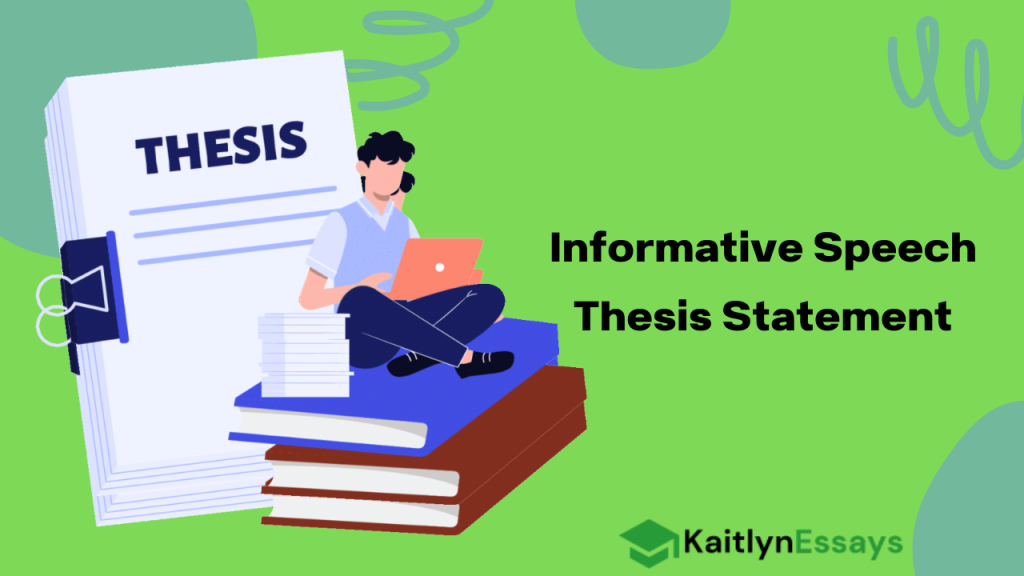
An informative speech thesis statement serves as the cornerstone of a compelling presentation, guiding the speaker’s content and providing clarity for the audience. In this paper we will examine the significance of the informative speech thesis statement, explore strategies for crafting an effective one, and analyze examples to illustrate its importance in delivering informative and engaging speeches.
Understanding the Informative Speech Thesis Statement
A thesis statement serves as the central idea or main point that the speaker seeks to convey to the audience. In an informative speech, the thesis statement succinctly outlines the topic of the presentation and previews the key points that will be covered.
Unlike persuasive or argumentative speeches, which seek to convince the audience to adopt a particular viewpoint or take action, informative speeches aim to educate, enlighten, or inform the audience about a specific topic. Therefore, the thesis statement in an informative speech should focus on providing factual information, presenting an overview of the topic, and guiding the audience’s understanding of the subject matter.
Elements of an Effective Informative Speech Thesis Statement
Crafting an effective informative speech thesis statement requires careful consideration of several key elements to ensure clarity, relevance, and coherence. Some essential elements to include in an informative speech thesis statement are:
- Topic Identification: Clearly identify the topic or subject matter that will be addressed in the speech. This helps the audience understand the focus of the presentation from the outset.
- Main Points Preview: Provide a brief overview of the main points or key aspects of the topic that will be discussed in the speech. This gives the audience an idea of what to expect and helps them follow the speaker’s presentation more effectively.
- Objective Tone: Maintain an objective tone in the thesis statement, avoiding persuasive language or personal opinions. The goal is to inform rather than persuade, so the thesis statement should focus on presenting factual information and providing an objective overview of the topic.
- Clear and Concise Language: Use clear and concise language to communicate the thesis statement effectively. Avoid jargon, technical terms, or complex language that may confuse or alienate the audience.
- Relevance: Ensure that the thesis statement is relevant to the audience’s interests, needs, or concerns. Tailor the content of the speech to address topics that are meaningful and pertinent to the audience.
Strategies for Crafting an Effective Informative Speech Thesis Statement

Crafting an effective informative speech thesis statement requires careful planning, research, and consideration of the audience’s needs and expectations. Here are some strategies to help you create a compelling thesis statement for your informative speech:
- Identify Your Audience: Before crafting your thesis statement, consider the demographics, interests, and knowledge level of your audience. Tailor your speech to address topics that are relevant and engaging for your specific audience.
- Choose a Clear and Narrow Topic: Select a topic that is specific and focused enough to be covered adequately within the time constraints of your speech. Avoid broad or overly complex topics that may overwhelm the audience or result in a lack of coherence.
- Conduct Thorough Research: Gather relevant information, data, and evidence to support your thesis statement. Conduct thorough research from credible sources, such as academic journals, books, reputable websites, and expert interviews.
- Outline Your Main Points: Before crafting your thesis statement, outline the main points or key aspects of the topic that you plan to cover in your speech. This will help you organize your thoughts and ensure that your thesis statement accurately previews the content of your presentation.
- Write and Revise: Draft your thesis statement and then revise it multiple times to ensure clarity, coherence, and relevance. Seek feedback from peers, mentors, or instructors to refine your thesis statement and make any necessary adjustments.
- Test for Clarity and Understanding: Once you have finalized your thesis statement, test it for clarity and understanding by presenting it to a sample audience or discussing it with peers. Ensure that your thesis statement effectively communicates the main topic and key points of your speech.
Examples of Effective Informative Speech Thesis Statements

To illustrate the principles discussed above, let us consider some examples of effective informative speech thesis statements:
- Topic: Climate Change
- Thesis Statement: “In this speech, I will discuss the causes, consequences, and potential solutions to climate change, highlighting the scientific evidence supporting the reality of global warming and its impact on the environment and human societies.”
- Topic: Artificial Intelligence
- Thesis Statement: “This presentation will provide an overview of artificial intelligence, including its history, applications, ethical considerations, and potential implications for the future of work, healthcare, and society at large.”
- Topic: Cybersecurity
- Thesis Statement: “In this speech, I will examine the importance of cybersecurity in the digital age, exploring common cyber threats, best practices for protecting personal and organizational data, and the role of government regulation and international cooperation in addressing cybersecurity challenges.”
- Topic: Mental Health Awareness
- Thesis Statement: “This informative speech aims to raise awareness about mental health issues, including common disorders, stigmas surrounding mental illness, available resources for seeking help, and strategies for promoting mental well-being and resilience.”
- Topic: Sustainable Living
- Thesis Statement: “In this presentation, I will discuss the principles of sustainable living, including eco-friendly practices for reducing carbon footprint, conserving natural resources, and promoting environmental sustainability in everyday life.”
Conclusion
Crafting an effective informative speech thesis statement is essential for guiding the content, structure, and delivery of a compelling presentation. By clearly identifying the topic, previewing the main points, and maintaining an objective tone, the thesis statement helps the speaker communicate key information to the audience and ensures that the speech remains focused, coherent, and engaging. By following the strategies outlined in this essay and studying examples of effective thesis statements, speakers can enhance the clarity, relevance, and impact of their informative speeches, thereby empowering audiences with valuable knowledge and insights.
Strive for academic excellence without sacrificing your well-being. Our writing service offers a stress-free solution to your toughest assignments, allowing you to focus on other important aspects of your life. From conducting thorough research to crafting polished essays, our dedicated team is committed to helping you achieve your academic goals with ease and confidence.
FAQs
What is an informative speech thesis statement?
An informative speech thesis statement is a concise declaration that outlines the main topic and key points of an informative speech. It serves as a guide for the speaker and provides clarity for the audience regarding the focus and purpose of the presentation.
What is the purpose of an informative speech thesis statement?
The purpose of an informative speech thesis statement is to inform the audience about the topic of the speech and provide a preview of the main points that will be covered. It helps establish the direction and structure of the presentation, ensuring coherence and clarity for both the speaker and the audience.
How is an informative speech thesis statement different from a persuasive speech thesis statement?
While both types of thesis statements serve to guide the content of a speech, an informative speech thesis statement focuses on presenting factual information and educating the audience about a topic, whereas a persuasive speech thesis statement seeks to persuade the audience to adopt a particular viewpoint or take action.
What are the key elements of an effective informative speech thesis statement?
Key elements of an effective informative speech thesis statement include clear topic identification, a preview of main points, an objective tone, clear and concise language, and relevance to the audience’s interests and needs.
How can I craft an effective informative speech thesis statement?
To craft an effective informative speech thesis statement, you should first identify your audience and their interests, choose a clear and narrow topic, conduct thorough research, outline your main points, write and revise your thesis statement for clarity and coherence, and test it for understanding.
Where should I place the thesis statement in my informative speech?
The thesis statement in an informative speech is typically placed at or near the beginning of the presentation, after the introduction and before the body of the speech. This allows the speaker to establish the topic and purpose of the speech early on and guide the audience’s understanding throughout the presentation.
Can I use personal opinions or persuasive language in an informative speech thesis statement?
No, an informative speech thesis statement should maintain an objective tone and focus on presenting factual information rather than personal opinions or persuasive language. The goal is to educate and inform the audience, not to persuade them to adopt a particular viewpoint.
Are there examples of effective informative speech thesis statements?
Yes, examples of effective informative speech thesis statements include statements that clearly identify the topic, preview the main points, use clear and concise language, and maintain relevance to the audience’s interests. These statements guide the speaker’s presentation and provide clarity for the audience.
How long should an informative speech thesis statement be?
An informative speech thesis statement should be concise and to the point, typically consisting of one or two sentences. It should effectively summarize the main topic and key points of the speech without being overly long or complex. This ensures clarity and helps the audience grasp the central idea of the presentation quickly and easily.
